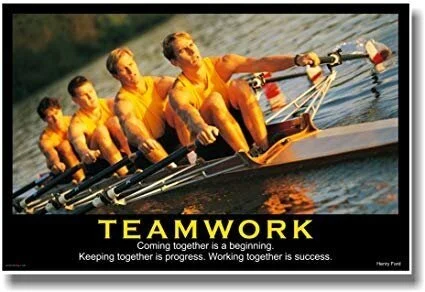Stop Teamwork Happy Talk
We’ve all seen them. Posters of rowing teams pulling together silhouetted against a golden sunset. Quotes from legendary coaches. Platitudes about teamwork outlined in a company’s “Core Values.” All of this amounts to lip service without any true action to support it.
As an external consultant, I would walk into the offices of companies like General Motors and AT&T and see the quotes and posters on the wall. I’d notice artifacts of team building exercises on people’s desks. Yet, as I spent any time in an organization, I’d see that most of the work was being done by individuals. When you think about it, it’s no surprise. They were hired as individuals, paid as individuals, promoted as individuals and, in most cases, recognized and rewarded as individuals.
Who really does the work?
So, when these skilled team members were presented with yet another “Team-Building” poster or exercise, you can imagine their less-than-enthusiastic responses. They got it. They knew that despite all the happy talk about teamwork, they were going to end up doing most of the work by themselves.
As a result, a cynicism has developed and the mere mention of teamwork makes people roll their eyes. This cynicism is one of the major problems we face as people who want to help teams perform better. There is a major divide between the generic notion of teamwork as an overall corporate good and the true application of teamwork and collaboration to drive performance.
There’s a place for posters and Personality Tests but they don’t improve teamwork
It’s an unfortunate divide because teamwork, understood accurately, has genuine promise. We simply have to leave the old narrative behind. While there is nothing inherently bad about Myers-Briggs surveys, inspirational posters, or ropes courses, research shows that they do nothing to enhance collaborative outcomes within the team. So, let’s call things what they are. Stress relievers. Employee satisfaction boosters. All of these are good things, but are not substitutes for or developers of teamwork.
There is real and rewarding work you can do to develop high performing teams. So, let’s stop the happy talk about teams and get into specifics about how we’re going to make teams better. We need a new language for building group effectiveness. That language begins with embracing a focus on what I call Intentional Collaboration.


